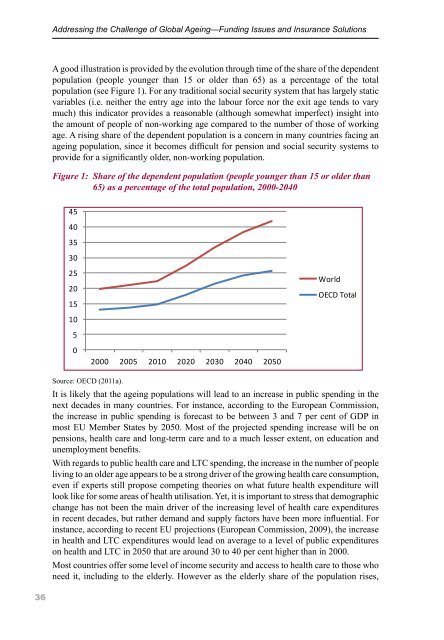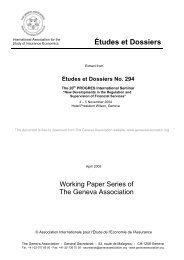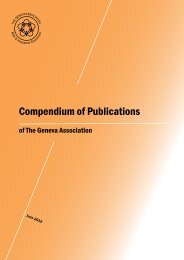Addressing the Challenge of Global Ageing—Funding Issues
Addressing the Challenge of Global Ageing—Funding Issues
Addressing the Challenge of Global Ageing—Funding Issues
You also want an ePaper? Increase the reach of your titles
YUMPU automatically turns print PDFs into web optimized ePapers that Google loves.
36<br />
<strong>Addressing</strong> <strong>the</strong> <strong>Challenge</strong> <strong>of</strong> <strong>Global</strong> Ageing—Funding <strong>Issues</strong> and Insurance Solutions<br />
A good illustration is provided by <strong>the</strong> evolution through time <strong>of</strong> <strong>the</strong> share <strong>of</strong> <strong>the</strong> dependent<br />
population (people younger than 15 or older than 65) as a percentage <strong>of</strong> <strong>the</strong> total<br />
population (see Figure 1). For any traditional social security system that has largely static<br />
variables (i.e. nei<strong>the</strong>r <strong>the</strong> entry age into <strong>the</strong> labour force nor <strong>the</strong> exit age tends to vary<br />
much) this indicator provides a reasonable (although somewhat imperfect) insight into<br />
<strong>the</strong> amount <strong>of</strong> people <strong>of</strong> non-working age compared to <strong>the</strong> number <strong>of</strong> those <strong>of</strong> working<br />
age. A rising share <strong>of</strong> <strong>the</strong> dependent population is a concern in many countries facing an<br />
ageing population, since it becomes difficult for pension and social security systems to<br />
provide for a significantly older, non-working population.<br />
Figure 1: Share <strong>of</strong> <strong>the</strong> dependent population (people younger than 15 or older than<br />
65) as a percentage <strong>of</strong> <strong>the</strong> total population, 2000-2040<br />
45<br />
40<br />
35<br />
30<br />
25<br />
20<br />
15<br />
10<br />
5<br />
0<br />
2000 2005 2010 2020 2030 2040 2050<br />
World<br />
OECD Total<br />
Source: OECD (2011a).<br />
It is likely that <strong>the</strong> ageing populations will lead to an increase in public spending in <strong>the</strong><br />
next decades in many countries. For instance, according to <strong>the</strong> European Commission,<br />
<strong>the</strong> increase in public spending is forecast to be between 3 and 7 per cent <strong>of</strong> GDP in<br />
most EU Member States by 2050. Most <strong>of</strong> <strong>the</strong> projected spending increase will be on<br />
pensions, health care and long-term care and to a much lesser extent, on education and<br />
unemployment benefits.<br />
With regards to public health care and LTC spending, <strong>the</strong> increase in <strong>the</strong> number <strong>of</strong> people<br />
living to an older age appears to be a strong driver <strong>of</strong> <strong>the</strong> growing health care consumption,<br />
even if experts still propose competing <strong>the</strong>ories on what future health expenditure will<br />
look like for some areas <strong>of</strong> health utilisation. Yet, it is important to stress that demographic<br />
change has not been <strong>the</strong> main driver <strong>of</strong> <strong>the</strong> increasing level <strong>of</strong> health care expenditures<br />
in recent decades, but ra<strong>the</strong>r demand and supply factors have been more influential. For<br />
instance, according to recent EU projections (European Commission, 2009), <strong>the</strong> increase<br />
in health and LTC expenditures would lead on average to a level <strong>of</strong> public expenditures<br />
on health and LTC in 2050 that are around 30 to 40 per cent higher than in 2000.<br />
Most countries <strong>of</strong>fer some level <strong>of</strong> income security and access to health care to those who<br />
need it, including to <strong>the</strong> elderly. However as <strong>the</strong> elderly share <strong>of</strong> <strong>the</strong> population rises,








